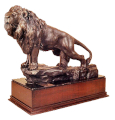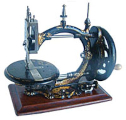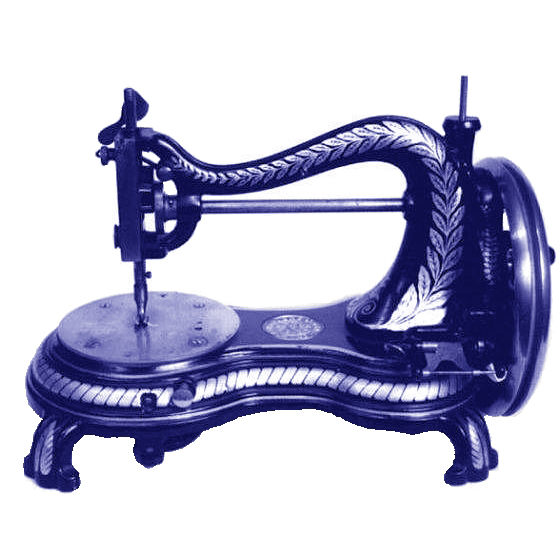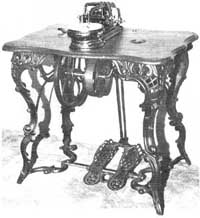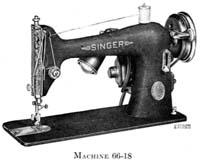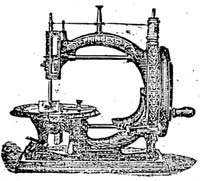Working for Singer, part 5
by Graham Forsdyke
ISMACS News
Issue No. 34
Early days at Singer
....... Continued from ISMACS 33
My latter years at Edinburgh were mostly employed introducing directory canvassing, etc, and supervising this work generally in Scotland, and this necessitated some very rough traveling.
When in the extreme north districts, the trouble in such counties as Sutherlandshire and Caithness is not so much in being able to get on good terms with the people, but rather in finding them, as one can easily tramp for hours and hours in these parts without even seeing a dwelling house. Sutherlandshire is very wild and grand, but for dreariness and loneliness, Caithness is without its equal.
I remember at one time while staying at Dingwall I had arranged to meet one of the superintendents at Strome, and started away by an early train; it was a single line, and in those days the carriages were not very luxurious for long journeys, therefore traveling was not very desirable in these regions.
On getting to my journey's end and meeting the superintendent, I learned he had only an hour before catching the mail cart to take him to the coast, where he had to catch a boat for Lewis; it was a rush, therefore, to get through my business with him.
When this was done, I wondered if it was possible to get back to Dingwall that day, so went to the station to make enquiries. I was given to understand that there was no regular train but that they were sending a "special" to Dingwall in about half an hour, on which I might get consent tot ravel.
I quickly went up to the hotel and got my bag, and on returning to the station had to present my trade-card, sign a risk note, and to pay a little more than the ordinary fare. When the "special" was shunted into the station I found it was a mixed goods and cattle train, and I was given a seat in the guard's van.
Never shall I forget this "joy-ride", for on reaching the very next station a number of sheep were taken in the van and delivered a few more stations further on. This was repeated twice on the journey, and as the guard was "Hieland" he scarcely spoke, and would not smile, although I exhausted my stock of stories and tricks, even when the sheep fleas began to work I gave him a step dance, but he only stared in blank amazement. I lifted up my voice in thanksgiving when I reached Dingwall that night.
During the years 1896 and 1897 I was asked to visit the northern depots, and also the Orkney and Shetland Isles, so as to be in the islands at the New Year to take stock.
This is perhaps the worst journey I ever experienced, as bad weather followed me all the way through. I left Aberdeen on the Saturday night and the weather was so bad that we did not reach the Orkneys until about Sunday mid-day. The storm increased in violence and we sheltered in Kirkwall harbor until late in the afternoon, when the captain determined to make an attempt to get away, for he said that he would never be forgiven if he failed to deliver the New Year mails.
From here I only had one fellow passenger, a Custom House officer. We got out of the harbor, and while under the shelter of the island it was not so bad, but as soon as we made an attempt to get in the open we were fairly knocked round by the heavy seas. It was not until the third attempt that we got away, and it was now early on the Monday morning and the storm had increased.
Sometimes we got into a blinding snowstorm, when it was impossible to see more than a few feet in front of us. The seas were washing over us, for the captain had to keep her head to the wind as much as possible. We were battered and knocked about all that day, and we lost the patent log. We never sighted the Fair Isle, and the captain said we were a good bit out of our usual course.
That night (although the captain swore at me) I spent on the bridge, and early on the Tuesday morning the look-out sighted a light ahead, and we found we had to swing round, as we had passed Lerwick. The captain immediately left the bridge and we had an early breakfast, oh what a breakfast -- Irish stew and steak and onions. The captain seemed rather surprised when he found I could "keep time" with him. When we landed at Lerwick it was stated that they were beginning to give us up as lost. the storm continued, and the snow was phenomenal, for usually the snow was not heavy on the Islands.
I spent my New Year in Lerwick, and on New Year's night the streets were a lively and animated scene, for the Shetlanders hold a ceremony called "Up-hellia", which is derived from the Norse, and means "end of the Feasts". The young men dress in all kinds of fancy dresses and are called the "Guisers". After parading the streets they came to the hotel, and danced until the early hours of the morning.
In visiting the Depot, I found the saleswoman with her sleeves rolled up, a rough apron on, and very busy setting a pair of gears into an old "Medium" machine. When the superintendent was away at the other Islands, she acted as mechanic, saleswoman, collector, and also did all the other work that was necessary.
I got weather-bound here for a few days, and then hearing there was a boat at Scalloway, on the other side of the island, I shouldered my bag and walked across in a wild snowstorm, in company with a postman with the mails.
When I reached there, I found the boat was run aground. When at last I got on the boat I found the crew were in the midst of their festivities, as they missed their "New Year" while at sea. I went to my bunk, but they would not let me rest, and I had to go out and entertain them.
We got afloat next morning and had another rough voyage to the Orkneys, and we had to land at Stromness instead of Kirkwall on account of this. We found the snow very heavy and had considerable trouble getting through to Kirkwall by wagonette. I was again weather-bound, and could not get away for some few days. When, however, I got away and reached Thurso on the Mainland, we learned that there was a complete block, and traveling communication with the south was entirely broken down.
The following day news arrived that a boat was leaving Wick for Aberdeen. This caused some excitement at the hotel, for there were a good many travelers held up, and who were anxious to get home. We made a general exodus, but my troubles were not yet ended, for our train ran into a snowdrift. We could neither go forward nor back out, and there we had to remain for four hours.
There were two other travelers in my compartment, and we soon began to condole with each other. I made the remark that it was a pity we had nothing to eat or drink, when one of the gentlemen sitting opposite said "We are all right for a drink", and he immediately got his case from the rack, and on opening it we found he was well supplied with samples of whisky -- he was a spirit traveler.
The other gentleman said "Well, we shall not starve, for I can provide the dough". He pulled his case from under the seat, and I found he had quite a good supply of his biscuit samples, for he was the representative of an Edinburgh biscuit firm.
We were quite a happy and lively little crowd, even the guard and the engine-driver found their way along the footboard, and got a dose of snow and whisky. We were at last ploughed out from the bank.
We had to go back to our hotel at Thurso, where some of my unfortunate companions gave up in despair and went to bed. However, two or three hours after, the "boots" came in and said the rail was open, and another train was going through. Some of us took advantage of this, and much to our surprise found we were in time to catch the boat at Wick.
We had an uneventful voyage until within a few miles of Aberdeen, when our boat got into a dense fog bank and ran down a trawler, although fortunately not doing a great deal of damage. I was indeed relieved and grateful when I reached home safely, after such a rough journey.
To be continued............
